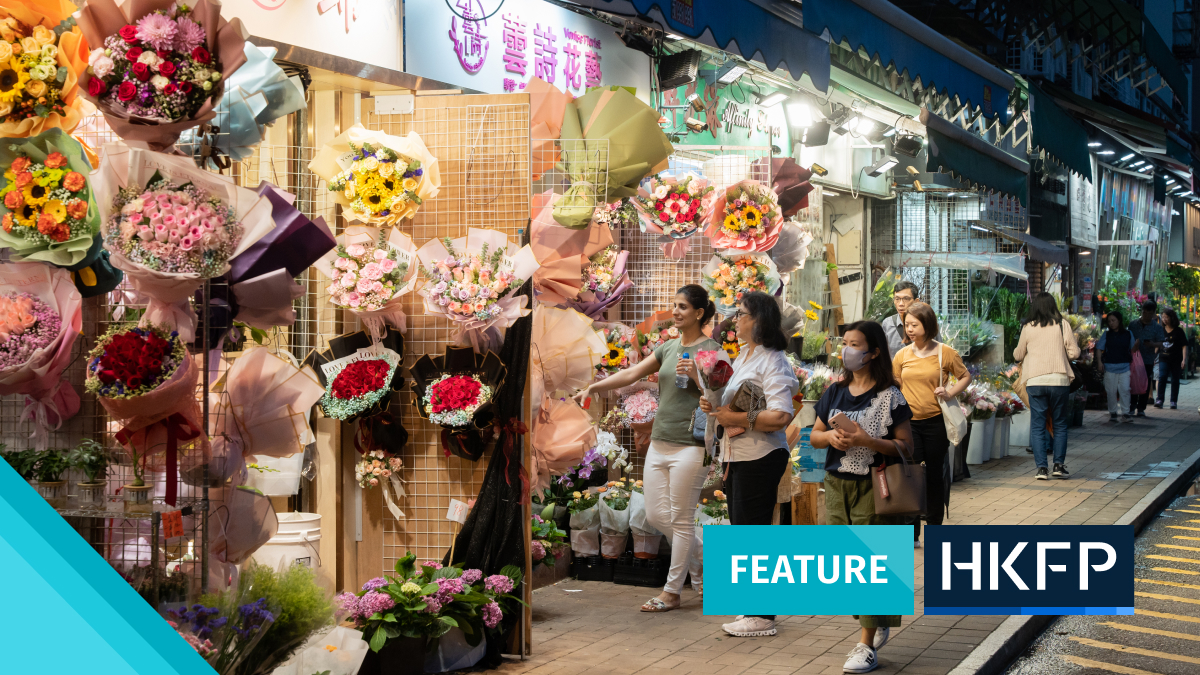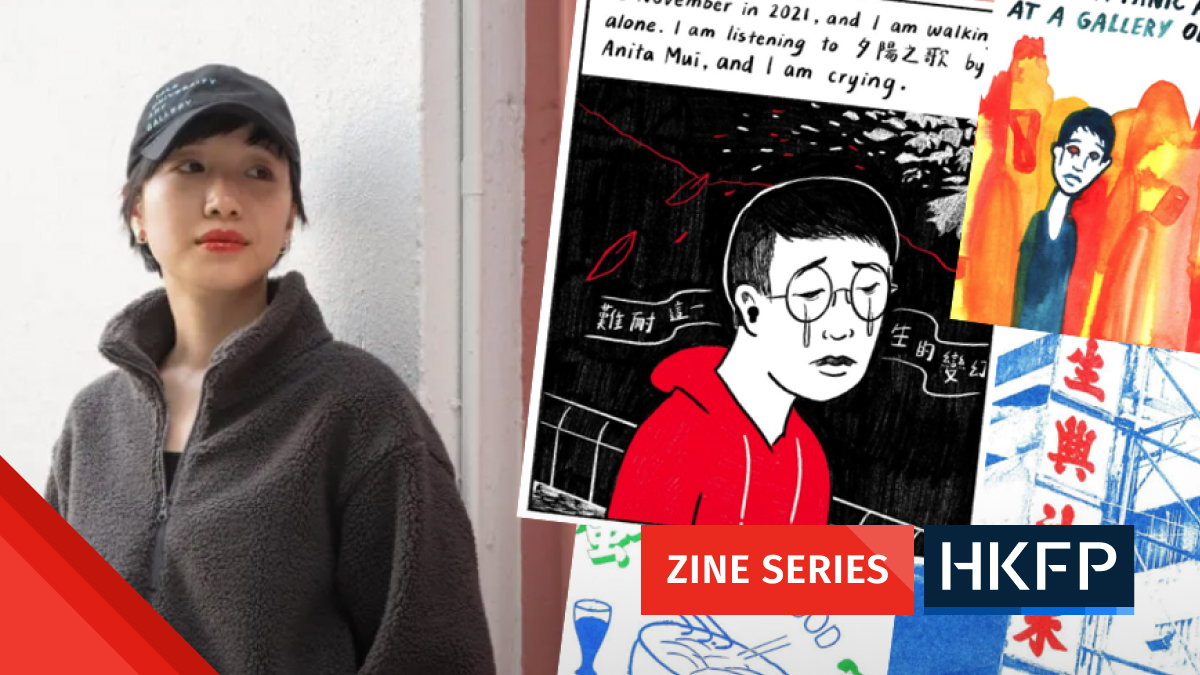When Hong Kong’s journalism students returned to school this year after the winter break, they faced a different media landscape – one that lacked two influential independent outlets.
Since the enactment of the Beijing-imposed national security law, the city’s press freedom ratings have plummeted. Reporters Without Borders’ latest report on the state of journalism in China, described press freedom in Hong Kong as in “free fall,” with journalists being prosecuted under national security offences in a city once considered to be “a champion of press freedom.”

As Apple Daily, Stand News, Citizen News, and other smaller independent local news outlets fell one after the other, Bloomberg reported that more than 1,000 journalists and journalism-related workers had been forced out of work in the city.
The loss of positions and opportunities did not only affect those already working in the media industry, but also students aspiring to become journalists.
“When I first entered journalism school, the biggest concern was poor pay,” Sara, who is in her fourth year at the School of Journalism and Communication in Chinese University of Hong Kong (CUHK), said with a bitter smile. “Now I am worrying about job opportunities, companies getting shut down, or even possibly being arrested.”
The party is over
As a part-time reporter at Stand News, Chloe Cheng bore witness to the outlet’s final few hours.
On December 29, national security police raided the office of Stand News and arrested seven figures linked to the non-profit outlet. Less than 24 hours later, the outlet had ceased operations, deleted its website and wiped its social media pages.

“A few nights before, we held a party at the very same space with the same group of people,” Cheng, who is also a final year journalism student at Hong Kong Baptist University (HKBU) , said. “It felt like night and day. And I never thought this day would come this soon.”
Cheng likened Stand News’ final day to “the last day of high school.”
“We seized every opportunity to take photos with each other and many of us could not hold back the tears,” she said, adding that she would not forget watching an assignment editor hugging a reporter while repeating: “It will be fine. It will be fine.”
Although the company was gone, Cheng said she and her former colleagues continued to see each other. Cheng said senior staffers had asked her and other part-time reporters, who were mostly final year journalism students, whether they were still hoping to become journalists after graduation.

“I could not give them an answer… none of us could,” Cheng said. The closure of Citizen News so soon after Stand News had left Cheng and the people around her disheartened.
Before joining Stand News, Cheng had been a summer intern at Citizen News. “It felt like I was witnessing the disappearance of the two institutions that nurtured me,” she said.
A bigger blow
For Sara, who declined to give her full name, the loss of Citizen News was a bigger blow than the closure of Stand News as she had expected the latter. Stand News had already been the target of top officials like Secretary for Security Chris Tang, with Tang accusing the outlet of “biased, smearing and demonising” reports about the city’s smart prison initiative in December.
But the closure of Citizen News, where Sara had worked for eight weeks last summer as an intern, was a shock to her. “I was thinking of joining Citizen News when I graduate… It was just before my birthday when I learnt the news and I felt very unhappy.”
Sara said student reporters were granted a great degree of freedom at Citizen News. “From interviews, photography, newswriting, graphic design to publishing, we could do everything.”
Even though they were interns, the news outlet still allowed them to be on the ground and cover important events like the raid of the Apple Daily newsroom last June. Sara said students were also encouraged to pitch stories and produce original video features with the help of experienced journalists.

Sara said internship programmes offered by other media outlets rarely provided such a degree of freedom and variety of training, yet the opportunity was no longer there for future journalism students.
‘Lucky they did not hire me’
When Kelvin woke up to the news of a police raid in place at Stand News, he was stunned. “I didn’t know how to respond,” he said.
The same evening that Stand News ceased operations, the former journalism student – who was a member of the Editorial Board at the City University of Hong Kong (CityU) Students’ Union and had reported from the frontlines of the 2019 protests – decided to give up on his dream.
Afraid of drawing unwanted attention to the CityU Students’ Union, which is currently under scrutiny by the university, Kelvin requested that HKFP did not use his real name.

In Kelvin’s view, the sudden end of Stand News was a greater blow to his aspirations than the closure of Apple Daily. “Even when Apple Daily closed, there was still space for me to do the reporting I wanted,” he said.
He said the online publication had been more cautious than Apple Daily. “It seems as if Stand News had already taken precautions, they did not spell everything out explicitly… but they were still accused by national security police.”
Kelvin said he did not see why law enforcement would not do the same to other media outlets. “It is better not to get in [to the news industry] at all than to lose your job in maybe two months’ time.”
Before the demise of Stand News, Kelvin had been to two interviews at two newspapers during his last semester at the university. “Now I somehow feel lucky that they did not hire me,” he said.
After Citizen News closed down, Kelvin was even more determined to leave the news industry, although he said he felt pity and was surprised by the speed of the change in Hong Kong’s media landscape.
Shrinking spaces
When reporters asked about the raid at Stand News, Chief Secretary for Administration John Lee told media workers to distance themselves from “bad apples” and “evil elements” that “endanger national security” and “pollute press freedom.”
For former Stand News employee Cheng, the possibilty of joining another news organisation “already feels like a pipe dream.”
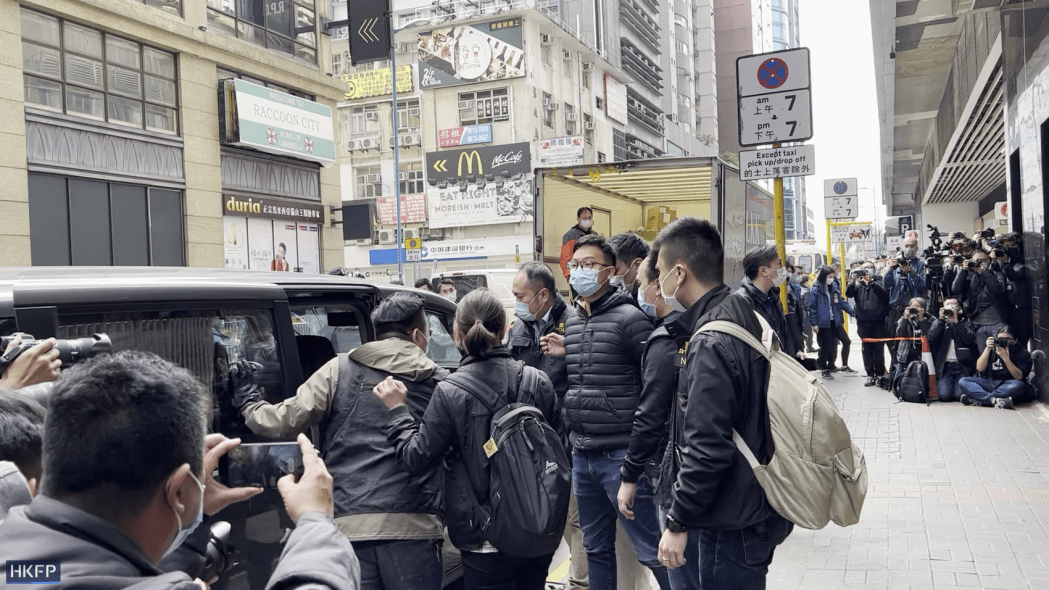
Even if she did not include her roles at Stand News and Citizen News on her CV, there were always records of her past work. “The newspapers still standing, like MingPao and Sing Tao, would they be willing to hire me?” she asked.
Besides, she was unsure whether she would be able to adapt to a more conservative outlets. “Will there be another place with the freedom [of Stand News]?”
Although the journalism student was aware that there were still smaller outlets operating on Telegram or Instagram, which were subject to less self-censorship that mainstream media organisations, she believed that their days were numbered. “When the mainstream media is backing down, no matter how hard the internet outlets hold on, sooner or later they will be targeted.”
With fewer independent local media outlets in Hong Kong, Sara was also concerned about whether she could press on as a reporter after her graduation in a year.
“What if even MingPao goes down? Then I really don’t know where I can go,” she said, adding that although the newspaper had been cautious in its reporting it had still been targeted by pro-Beijing media outlets.
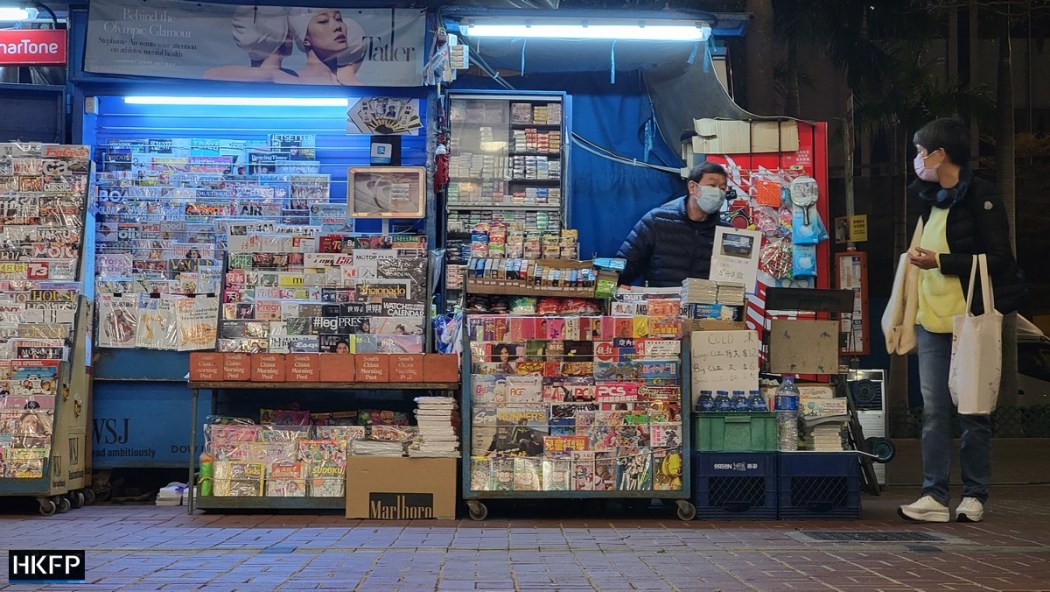
On January 10, the Chinese state-owned newspaper Ta Kung Pao attacked MingPao over an opinion piece about the removal of Tiananmen monuments from universities. After the closure of Stand News, MingPao added a disclaimer to its opinion section stating that it “has no intention to incite hatred to others or the government.”
Blurred red lines
Faced with the blurred red lines of the city’s national security legislation, Sara said she believed it was still possible for the media to fulfill its duty of critiquing the government’s wrongdoings and monitoring those in power.
“Yet it will only get more difficult,” she said. “We need to be even milder and take precautions, though they may only make you feel a little better and will not guarantee any protection.”
Meanwhile, in Kelvin’s eyes, Hong Kong’s media landscape no longer contains the space for him to achieve his aspirations.
“I enjoyed doing investigative reporting and research, and I wanted to write stories about localist thoughts,” the former CityU student reporter said.

Before, Stand News would carry interviews and articles about localism. However, since its closure there was no outlet left in the city which allowed open discussions about localists or their ideologies.
Kelvin also said the situation of self-censorship in mainstream media has become more serious. “Ther always support the government’s ideology… their editorials and opinion pieces convey nothing but the government’s thoughts.”
Although he observed that there were still some oppositional voices reported by mainstream media, such as when the residents of Kwai Chung Estate displayed their disapproval of the government’s handling of Covid-19 lockdown measures, he felt that “major dissenting opinions were nevertheless missing,” and the media was only “critical on minor issues but helpful [to the authorities] in important matters.”
“I do not want to work just for the salary,” Kelvin said, adding: “I do not wish to censor myself or give up on stories I want to pursue because of the political stance of my media company.”
‘We talked, we cried’
Cheng’s determination to cover the news was ignited on June 9, 2019, when an estimated 1 million people took to the streets to rally against the proposed amendment to Hong Kong’s extradition bill. Over the months of protests and unrest that followed, Cheng and other student reporters continued to cover the demonstrations despite not being paid.
She has vivid memories of reporting on the clashes at CUHK between protesters and riot police, where she saw fellow journalists injured as the university was turned into “almost a battlefield.”
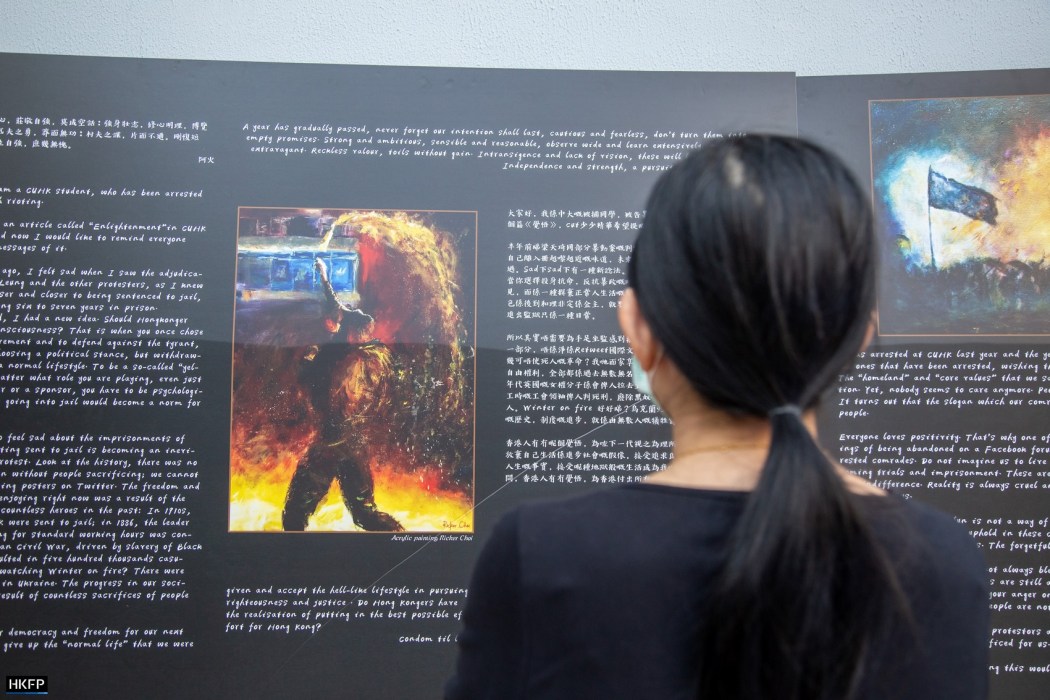
But Cheng did not falter as a reporter because there were several journalism schoolmates pressing on with her.
“They let me know that I was not on my own,” Cheng said. Whenever bad things happened, “we talked, we cried, then we would be fine.”
However, the sudden closure of Stand News was a bigger blow to Cheng and her friends than anything that had come before. Witnessing a close friend lose the will to continue reporting, Cheng said she was “very disheartened.”
She said her friend had shown great perseverance in the past, attending Coroners’ Court cases and rushing to areas under Covid-19 lockdowns even when no editor asked.
“You can see how large the impact of the Stand News incident was,” Cheng said.
Compromises, questions
However, while some have turned their backs on journalism, there are those who remain committed, knowing that it might involve compromises.
Despite her earlier hesitation, Cheng is one of them. She believes that reporters can still focus on fundamental problems in people’s daily lives, such as “stories about underprivileged people in society.”

“I hope that my writing can at least bring attention to minor topics on human rights, such as the hardships of the working class… The problems are impossible to ignore.”
As far as Cheng is concerned, there is still room for public opinion to force the government or lawmakers to face these issues.
“Afterall, if I quit as a reporter, there would be one less voice speaking for these people.”
Sara, too, remains committed to the cause, saying that she would fine tune certain wordings and take precautions while reporting as long as the core message of a story could be delivered. “People may still understand the meaning,” she said.
One of the meanings of being a reporter for Sara was to bring more information to the public’s knowledge.
“After losing some media outlets, we can see in Covid-19 coverage that everyone is repeating what the officials said, but there are deeper questions to ask,” she said, citing questions posed by former iCable News journalists on social media, such as whether the “zero Covid” aim was practical if people could be infected by passers-by.

“If these reporters were still here, we would not need to resort to guessing about these questions,” she said. “If there are more members of the press, more facts can be brought out as grounds for public deliberation.”
Moving forward
In the past, there was a relatively straightforward path for journalism students. “You get an internship at a news media company, then stick to it as a part time staff, in hopes of getting hired as a fulltime after graduation,” Cheng said.
“But such a chain no longer applies.”
Neither of the companies Cheng worked for exist anymore.
Cheng had no intention of finding another part-time journalist job. Instead, she wanted to make good use of her remaining time at university to explore her interests and sharpen her writing skills.
“Then maybe I will start in the breaking news team at a local newspaper.” she said.
Sara, who is working as a part-time finance reporter at a local radio station, said she wanted to cover news that was more relevant to her daily life.

Inspired by the court coverage from Citizen News, Sara said hoped to join the court reporting team at a local newspaper after graduation.
With no desire to give up on writing – what she is good at and enjoys – she told HKFP: “I will look for opportunities to do court or investigative reporting until there is no more room for any critical opinions and reporting becomes meaningless.”
“If that is ever the case, I will cover softer topics like culture and lifestyle, or work for publishers instead.”
Journalism schools
When asked whether there were any signs that younger generations were becoming more hesitant to study journalism, Rose Luqiu, associate head of the Department of Journalism at HKBU, told HKFP that the numbers of applicants for their programme had actually gone up in the past year.
However, the effect of the Stand News and Citizen News closures on secondary school graduates’ intentions to study journalism will not be reflected until the enrollment figures in 2022 are released.
“It is true that some may be discouraged, but others who are fond of journalism may like it even more. Some have found journalism to be more important than ever,” said Luqui.

Keith Richburg, director of the Journalism and Media Studies Centre at the University of Hong Kong, told HKFP that as people realised there were fewer opportunities at independent local media in the city, more might want to try to get into international media outlets.
According to Richburg, teaching has remained mostly unchanged and staff have not been subject to any pressure from the university since the enactment of the national security law, under which he thinks good journalism is still possible.
“They haven’t said that they are outlawing journalism here,” Richburg said. “There [is] still good journalism coming out of places that are far more restrictive right now, and far more dangerous for journalists than Hong Kong.”
Richburg said the newer generations of journalists in Hong Kong should keep on reporting. “Your job is to go out there and keep pushing, keep exposing stories, finding problems, exposing faults in government policies… that’s what journalists do. They don’t sit there and cower, worrying about what they can’t do, they go out there and do what they can.”

For Cheng, journalism is still worth pursuing in Hong Kong. “Our degree of press freedom may have gone from 20 marks to zero, but it has always been negative 20 in mainland China, yet people still carry on.”
Stepping back onto campus for her last year of study at CUHK, Sara said she is attending lessons outside of her registered schedule and she was worried whether teachers who had been vocal in the media would have their contracts renewed.
“I am learning as much as I can, when things are still available.”
Support HKFP | Policies & Ethics | Error/typo? | Contact Us | Newsletter | Transparency & Annual Report | Apps
Help safeguard press freedom & keep HKFP free for all readers by supporting our team

Original reporting on HKFP is backed by our monthly contributors.
Almost 1,000 monthly donors make HKFP possible. Each contributes an average of HK$200/month to support our award-winning original reporting, keeping the city’s only independent English-language outlet free-to-access for all. Three reasons to join us:
- 🔎 Transparent & efficient: As a non-profit, we are externally audited each year, publishing our income/outgoings annually, as the city’s most transparent news outlet.
- 🔒 Accurate & accountable: Our reporting is governed by a comprehensive Ethics Code. We are 100% independent, and not answerable to any tycoon, mainland owners or shareholders. Check out our latest Annual Report, and help support press freedom.
- 💰 It’s fast, secure & easy: We accept most payment methods – cancel anytime, and receive a free tote bag and pen if you contribute HK$150/month or more.
MORE Original Reporting
HKFP has an impartial stance, transparent funding, and balanced coverage guided by an Ethics Code and Corrections Policy.
Support press freedom & help us surpass 1,000 monthly Patrons: 100% independent, governed by an ethics code & not-for-profit.






